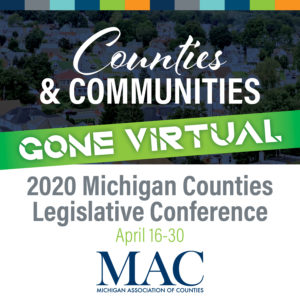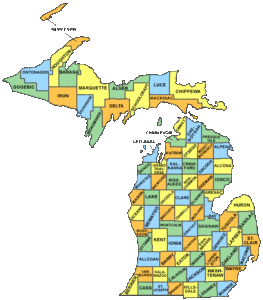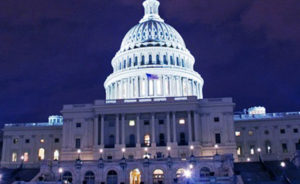Legislative Update 4-10-20
MAC replaces physical conference with virtual event
 Keynote addresses from Michigan Chief Justice Bridget Mary McCormack and National Association of Counties Executive Director Matt Chase will bookend a special “virtual edition” of the MAC Legislative Conference between April 16 and 30.
Keynote addresses from Michigan Chief Justice Bridget Mary McCormack and National Association of Counties Executive Director Matt Chase will bookend a special “virtual edition” of the MAC Legislative Conference between April 16 and 30.
Conference Page on MAC Website
As Michigan continues to combat the COVID-19 threat, MAC was forced to cancel the usual conference gathering in Lansing that had been set for April 15-17.
“To meet our responsibilities to members for professional development, we have created this free virtual event that extends over two weeks to allow maximum flexibility for participation,” explained Executive Director Stephan Currie. “In addition, all events will be recorded and provided on our website for 24/7 viewing, both during and after the conference.”
McCormack, who has led Michigan’s highest court since January 2019, has been a strong and consistent voice for reforms and innovation in the judicial world, including partnering with
MAC and others on the Jail and Pretrial Incarceration Task Force. (See full bio.) On April 16, she is expected to address that effort, along with such issues as trial court funding, indigent defense, court organization and more. After her address, she will take questions.
On April 30, NACo’s Chase will provide an overview of federal responses to the COVID-19 crisis and how Michigan county leaders can assist NACo in gaining proper assistance for counties as the crisis continues.
Please note that members must pre-register for each conference event they want to view. All events are free to attend virtually. After the event, a recording will be placed on the MAC website for 24/7 viewing.
Save the date: Treasury sets webinar on April 20
 The Michigan Department of Treasury, in partnership with the Michigan Association of Counties, the Michigan Municipal League and the Michigan Townships Association, will hold a joint webinar, COVID-19 Updates and Resources for Local Governments, on April 20 at 2 p.m.
The Michigan Department of Treasury, in partnership with the Michigan Association of Counties, the Michigan Municipal League and the Michigan Townships Association, will hold a joint webinar, COVID-19 Updates and Resources for Local Governments, on April 20 at 2 p.m.
Topics will include local government economic impacts, state resources, and federal funding information. Additionally, there will be a question and answer period. Please submit your questions to Deena Bosworth at bosworth@micounties.org by Thursday, April 16.
State loosens rules on use of veteran service grants
 The Michigan Veteran Affairs Agency (MVAA) this week announced expanding options to counties that have already submitted for County Veteran Service Funds due to COVID-19. Counties can complete a budget amendment to help alleviate some of the emerging financial burdens your veterans are facing under new circumstances.
The Michigan Veteran Affairs Agency (MVAA) this week announced expanding options to counties that have already submitted for County Veteran Service Funds due to COVID-19. Counties can complete a budget amendment to help alleviate some of the emerging financial burdens your veterans are facing under new circumstances.
For counties that did not meet deadlines or were not awarded funds already, the MVAA is waiving some eligibility criteria to allow “emergent, immediate and director financial assistance to its veterans, service members, and eligible family members in your county.” Two options are outlined here.
Questions can be submitted to Marie Douville at douvillem@michigan.gov, and your final application to MVAAGrants@michigan.gov.
 Revenue sharing checks head to counties on April 30
Revenue sharing checks head to counties on April 30
MAC has confirmed that the April bimonthly payments to counties for FY20 revenue sharing will go out as planned.
The April checks will be the fourth of six regularly scheduled, bimonthly payments to counties.
Counties are slated to receive a grand total of $226.5 million in statutory revenue sharing payments for FY20, which ends Sept. 30.
HEROES Act would aim tax holiday at health workers, first responders
 Rep. Bill Huizenga (R-MI 2) has introduced the Helping Emergency Responders Overcome Emergency Situations (HEROES) Act of 2020, which would provide a four-month federal income tax holiday for medical professionals and first responders, including: law enforcement officers, corrections officers, firefighters, EMTs, paramedics, pharmacists, nurses, nurse practitioners, physician assistants, doctors, hospital and licensed medical facility support staff and senior care facility staff. In order to be eligible, the qualified first responder must provide services in a county that had at least one positive COVID-19 patient or provides services in a licensed medical facility located in such a county.
Rep. Bill Huizenga (R-MI 2) has introduced the Helping Emergency Responders Overcome Emergency Situations (HEROES) Act of 2020, which would provide a four-month federal income tax holiday for medical professionals and first responders, including: law enforcement officers, corrections officers, firefighters, EMTs, paramedics, pharmacists, nurses, nurse practitioners, physician assistants, doctors, hospital and licensed medical facility support staff and senior care facility staff. In order to be eligible, the qualified first responder must provide services in a county that had at least one positive COVID-19 patient or provides services in a licensed medical facility located in such a county.
The Michigan County Medical Care Facilities Council supports the measures in the HEROES Act of 2020.
“The HEROES Act is modeled after how members of the military serving in combat zones designated by the Department of Defense are exempted from having to pay federal tax on their income. The legislation also provides the Secretary of the Treasury with the ability to extend the tax holiday for up to an additional three months,” Huizenga said in a statement.
 Coronavirus relief bill includes $250B for smaller local governments
Coronavirus relief bill includes $250B for smaller local governments
“On April 7, U.S. Reps. Ben Lujan (D-N.M.), Andy Levin (D-Mich.), Tom Malinowski (D-N.J.) and Joe Neguse (D-Colo.) introduced the Coronavirus Community Relief Fund Act, which would create a new $250 billion coronavirus relief fund for local governments with populations under 500,000,” reported the National Association of Counties. “In addition to providing direct payments from the U.S. Treasury to local governments, the bill would also cover lost revenue due to COVID-19. The bill text can be found here.
Senate wrangles with fourth federal rescue measure

“On April 9, the U.S. Senate adjourned following stalled negotiations over a fourth ‘interim’ FY 2020 supplemental appropriations package,” reports the National Association of Counties.
“First, Senate Democrats blocked Sen. Mitch McConnell’s attempt to provide $250 billion for small businesses, and then McConnell stopped Democrats’ attempt to pass a proposal (Interim Emergency COVID-19 Relief Act) that would combine the small business aid with several other provisions including: An additional $150 billion in aid to state, tribal and local governments to address necessary expenditures incurred due to the COVID-19 public health emergency. Of the $150 billion, $53.55 billion would be distributed directly to localities based on the Community Development Block Grant (CDBG) formula, which would be administered by the U.S. Treasury within 15 days of the bill’s enactment. The legislation would also allow the funding to be used for lost revenue.
- $100 billion to bolster hospitals and community health centers, with funds going toward the production of coronavirus tests and protective medical equipment.
- Fifteen percent increase to the maximum Supplemental Nutrition Assistance Program (SNAP) benefit and would maintain the current suspension of work requirements for able-bodied adults would be extended for two years.
- $250 billion to support the SBA’s Payment Protection Program and other economic recovery efforts.
- Technical fixes to election assistance grants to ensure funding is flexible and targeted to local elections officials.
“Negotiations are likely to continue over the weekend prior to the Senate returning in pro forma session on Monday, April 13.”
For more information on federal policy on COVID-19, visit the NACo resources site.
 New feature: Staff picks
New feature: Staff picks
Starting this week, Legislative Update will feature a round-up of news and information links suggested by members of MAC’s staff:
Understanding the true state of broadband connectivity in America (NACo)
Is America ready for a second wave of coronavirus? (Route Fifty)
State budget fallout: ‘A hurricane that hits all over the country’ (Governing)
How to think about coronavirus like a public health expert (University of Michigan)







